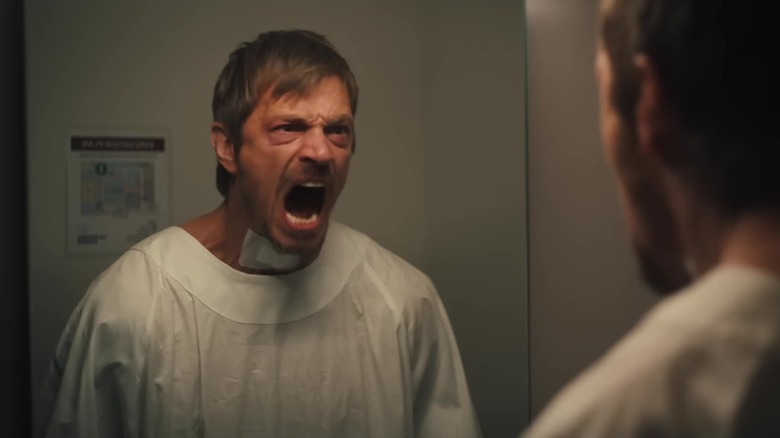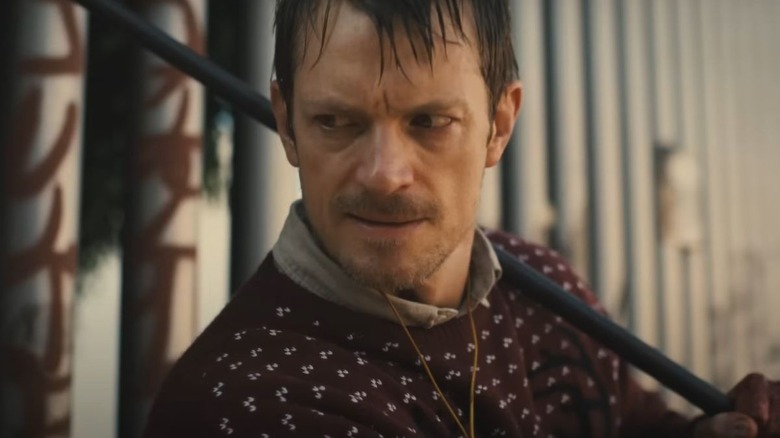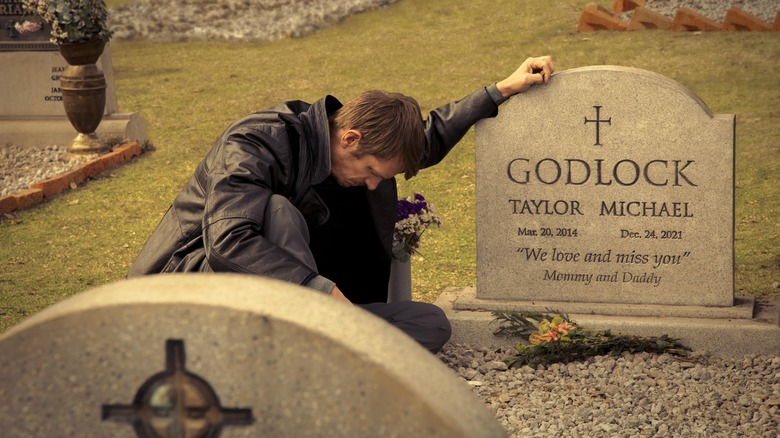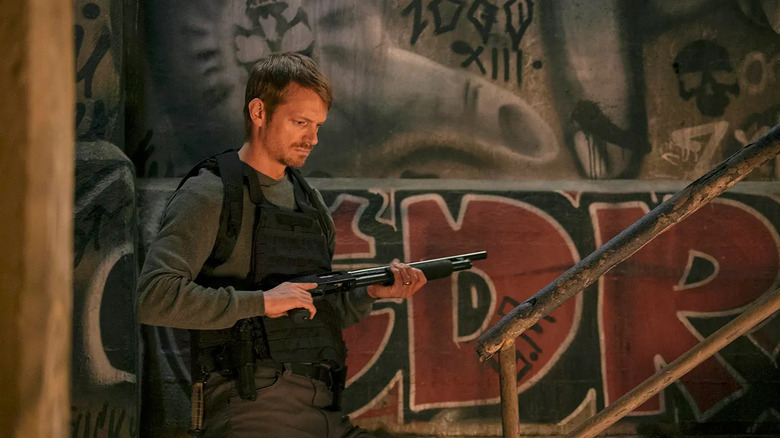Silent Night Star Joel Kinnaman On Emotional Preparation And Working With John Woo [Exclusive Interview]
For some actors, the idea of playing a dialogue-less role feels inherently like a downgrade. That mentality is likely a persistent holdover from the world of live theatre, where being silent can often mean you're not perceived by the audience. In the world of cinema, however, a picture can literally be worth a thousand words, and body language worth ten times that. So while having no dialogue in a film may seem like a breezy acting gig on the surface, it's often just as much of a challenge as having a monologue.
That's what actor Joel Kinnaman realized when he was approached to play the lead in John Woo's new action opus, "Silent Night." Although his character of Brian Godlock suffers an injury to his throat, robbing him of the power of speech, Kinnaman appears in virtually every scene of the film, and has the biggest job of carrying the audience through Brian's vigilante quest to take out all the street gang members he can as retribution for the murder of his young son. As if that weren't enough, he's the first English-speaking lead since Ben Affleck to work with the master action director Woo, and is thus charged with making the filmmaker's return to Hollywood feel special.
When I spoke to Kinnaman recently on the eve of the film's release, the actor seemed very cognizant of not just all these responsibilities, but the wonderful opportunities they offered him as well. During our brief chat, Kinnaman talked about calibrating his dialogue-free performance for a complex character, seeing Woo execute his unique style up close, and what drew him to the project in the first place.
Note: This interview has been lightly edited for brevity and clarity.
'It was a much bigger challenge than I thought'
When you first get that script and you're looking on the page for your character's name, usually to see how much dialogue you have, and you see that there's no dialogue, do you as an actor start getting excited or start getting scared at that prospect?
For me, this was presented to me like a hardcore action movie with zero dialogue that John Woo is directing. And I'm like, "I am in." Very exciting. I didn't expect how challenging it was going to be, acting-wise. It was a much bigger challenge than I thought. When you have text and dialogue, you're telling the story and you're finding a way to say it. And you don't always necessarily have to be so fully engaged — or it doesn't feel that way, anyway.
And also in the emotional scenes, when you have emotional scenes, usually the text can be like an anchor, and it helps drive your emotion into the situation. Here, all that is removed. I realized very quickly that to be able to tell this story, I have to be 100% in the moment in the situation, because I only have my eyes to tell the story and these little facial expressions, these little micro expressions coming from us. And those only come when you're a hundred percent emotionally engaged in the situation. So yeah, it just demanded a much more intense emotional preparation for each scene. Every take, I had to be a hundred percent there.
'It ultimately drives him to a place where he loses his humanity'
You mentioned using your expressions more, giving a lot through your face and your eyes. I was really taken by how Brian is a very complex and nuanced character. He's not a square-jawed normal dude hero. He's got a lot of darkness and a lot of anger in him. How did you feel portraying that? Was it something you were a little nervous about? I found it very compelling.
Yeah. To me, of course, the film that audiences are going to see is a very high-octane, high-paced action movie that has a very emotional setup to get to that [action]. But at the core of the character that I'm playing and the way that I'm playing the character, it's a real tragedy. It's a man that loses his son that is his light, the light of his life. His son embodies a love that he's never felt before. And when his son gets ripped away, he loses that and loses his connection with love. So he can't reconnect with his wife, he can't reconnect with life. And the only thing that he can connect with is this idea and what becomes an obsession of making the people that took this away from him pay. And it ultimately drives him to a place where he loses his humanity.
'It was amazing working with John'
You took the film in large part to work with John Woo, obviously. How was that process for you? Was it everything you expected? How did your communication work with him in terms of building this performance and this character?
Yeah, it was amazing working with John and to watch him. He was incredibly collaborative and very open to discuss ideas. Because when you remove an element like, there is no dialogue, it really frees you up in a way, because we know we're telling this story with this scene. This is the emotional story that we're telling with the scene, and the character is going from this point to that point. But how we get there, it's so open to interpretation. So it was pretty creative. And John was incredibly prepared. Sometimes he had a beautiful shot designed to tell the whole story of this scene, and sometimes we would have a conversation and then he would just follow me and then he would create another shot on the fly that would tell the story in a different way. He has the nickname of being the master of the camera, and it was beautiful to watch and I learned so much about visual storytelling by the way that he moved the camera and how he chose to use the camera to tell the story.
"Silent Night" is in theaters now.



